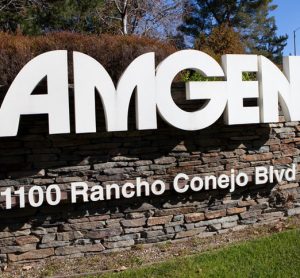Analysis of rilotumumab data identifies a potential predictive biomarker for patients with gastric or gastroesophageal cancer
Posted: 16 May 2012 | | No comments yet
Exploratory biomarker analysis results…


Amgen (NASDAQ: AMGN) announced today results from an exploratory biomarker analysis evaluating MET expression as a predictor of clinical response to rilotumumab (AMG 102). This analysis, conducted on a previously reported Phase 2 study of rilotumumab in patients with locally advanced or metastatic gastric or gastroesophageal cancer, showed that treatment with rilotumumab in combination with chemotherapy improved median overall survival (OS) in patients whose tumors exhibited high MET protein expression. Full results of the study will be presented in an oral presentation at the 48th Annual Meeting of the American Society of Clinical Oncology (ASCO) on June 2 (Abstract 4005, 4:45 p.m. – 5:00 p.m. CDT, E Hall D1).
Rilotumumab is an investigational fully human monoclonal antibody designed to inhibit the hepatocyte growth factor/scatter factor (HGF/SF): MET pathway. In this exploratory analysis, the addition of rilotumumab to chemotherapy in patients with gastric tumors with high MET expression improved median OS from 5.7 months to 11.1 months (HR = 0.29, 95 percent CI, 0.11 – 0.76). Conversely, in patients with gastric tumors with low MET expression, the addition of rilotumumab to chemotherapy was associated with a trend towards unfavorable OS (HR = 1.84, 95 percent CI, 0.78 – 4.34). These results have led Amgen to plan a Phase 3 study to confirm the efficacy of rilotumumab in advanced gastric and gastroesophageal cancer with high MET expression.
“These data are the first to demonstrate a potential biomarker for treatment with rilotumumab in gastric cancer, the second leading cause of cancer deaths worldwide,” said Michael Severino, M.D., senior vice president, global development and corporate chief medical officer at Amgen. “Personalized medicine has the potential to transform cancer care, and by leveraging our understanding of biology and the mechanism of disease, we hope to identify safe and effective new treatments for patients who aren’t well-served by current therapies.”
Primary results of the study were presented at the 2011 European Multidisciplinary Cancer Congress and showed that the primary endpoint of progression-free survival (PFS) had a trend towards a better outcome with rilotumumab plus chemotherapy. The addition of rilotumumab to chemotherapy improved median PFS from 4.2 months to 5.6 months (HR = 0.64, 80 percent CI, 0.48 ? 0.85). The secondary endpoint of OS also trended in favor of rilotumumab, with improved median OS from 8.9 months to 11.1 months (HR = 0.73, 80 percent CI, 0.53 ? 1.01).
The most common adverse events seen in the rilotumumab plus chemotherapy arms included peripheral edema, neutropenia, anemia, thrombocytopenia and deep vein thrombosis. There were no major differences in adverse events between the two rilotumumab arms.
Amgen and Dako have entered into a collaboration to develop and evaluate the use of a companion diagnostic test in the development of rilotumumab.
In addition to the results from this study, data from studies of 12 Amgen investigational molecules and marketed products will be presented at the ASCO Annual Meeting. These include results from studies of the immunotherapy talimogene laherparepvec, pipeline molecules such as blinatumomab (AMG 103) and AMG 386, and marketed products. A complete listing of Amgen abstracts of interest can be found at www.amgen.com/media/amgen_asco_2012.html. Abstracts are available online at www.asco.org.
Phase 2 Study Design
In this Phase 2, three-arm trial, 121 patients were randomized 1:1:1 to receive epirubicin, cisplatin and capecitabine (50mg/m(2) IV day 1, 60mg/m(2) IV day 1, 625mg/m(2) BID orally days 1-21, respectively) in combination with two different dose levels of rilotumumab (Arm A 15 mg/kg Q3W, n=40; Arm B 7.5 mg/kg Q3W, n=42) or placebo (Arm C, n=39). The primary endpoint of the study was PFS. Secondary endpoints included OS, objective response rate (ORR) and safety. In the biomarker analysis, 90 patients were evaluated for MET protein levels using an immunohistochemistry test. Twenty-seven patients from the rilotumumab treatment arms and 11 patients who received placebo were found to have tumors with high MET expression, defined as greater than 50 percent of tumor cells testing positive for the MET protein.
About Gastric Cancer
Gastric, or stomach, cancer is the second most common cause of cancer-related death in the world, accounting for 736,000 deaths worldwide in 2008. The highest mortality rates are in Eastern Asia.[1] An estimated 21,320 new cases of gastric cancer will be diagnosed in the United States in 2012, and about 10,540 Americans will die from this type of cancer.[2] Gastric cancer is a disease that mostly affects older people with nearly two-thirds of patients age 65 and older.[3]
References
- Cancer. World Health Organization website. http://www.who.int/mediacentre/factsheets/fs297/en/. Accessed April 26, 2012.
- Stomach Cancer. American Cancer Society website. http://www.cancer.org/Cancer/StomachCancer/DetailedGuide/stomach-cancer-key-statistics. Accessed April 26, 2012.
- Stomach Cancer. American Cancer Society website. http://www.cancer.org/Cancer/StomachCancer/DetailedGuide/stomach-cancer-key-statistics. Accessed April 26, 2012.




